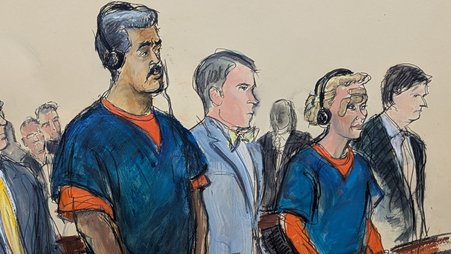There’s been plenty of speculation over how The Atlantic editor Jeffrey Goldberg found himself on a Signal thread with top-level Trump administration officials. The latest version of the story is that national security adviser Mike Waltz inadvertently saved Goldberg’s phone number as an alternate number for a National Security Council spokesperson.
But people don’t seem as curious about an arguably more consequential question: Why did Goldberg leave the chat? Who knows how many more scoops he could have gotten about this secretive administration’s secretive bombing campaigns by sticking around?
Goldberg claims that once he confirmed the chat was real, his work was done — he had what he needed to report on the operational security breach. Plus, according to The Atlantic’s editor, the conversation was getting too sensitive for journalists’ eyes. Those explanations didn’t sit right with some reporters. The Iraq War was far from a golden age of American journalism, but imagine if a reporter took their BlackBerry and went home after finding themselves privy to a conversation between Dick Cheney and Donald Rumsfeld.
But what if that’s not really the reason Goldberg saw himself out? What if, instead, The Atlantic’s lawyers told him he could be prosecuted for involuntarily receiving text messages? As Neiman Lab noted, Trump has not exactly been subtle about his desire to prosecute journalists who publish leaks, and Goldberg’s legal team knows that.
Professors and editors can grapple with the ethics of publishing secrets the government itself discloses, but the law should have no role in the decision.
In the past, the federal government prosecuting a journalist for its own negligence would’ve seemed absurd. No more — and not only because of Trump. Press freedom organizations spent years warning about the risks of the Biden administration continuing Trump’s Espionage Act prosecution of WikiLeaks founder Julian Assange for obtaining and publishing government secrets from a source. The case — which ended up as the first successful prosecution of a publisher (as opposed to source) under the Espionage Act — set a precedent allowing criminalization of routine journalism at presidents’ whims.
The counterargument from Biden’s Justice Department was essentially that Assange was a bad journalist, or not a journalist at all. Yes, the Espionage Act’s text doesn’t distinguish between the Assanges and the Goldbergs. But Assange’s prosecution, it was argued, nonetheless need not concern “real” journalists, who could trust the government to leave them alone.
Officials made this case with a straight face even though they’d already experienced Trump 1.0 and knew he might win again. And Trump wouldn’t even be the first to go after journalists for receiving information the government accidentally gave them.
After the administration began lashing out at Goldberg, a reporter asked me what authoritarian regime its conduct most reminded me of. My answer was Los Angeles. That city sued journalist Ben Camacho for publishing records it gave him pursuant to a public records request. The case got thrown out last year. The Supreme Court has repeatedly rejected efforts to prosecute, censor, or sue journalists for reporting what the government itself released to them. But those weren’t Espionage Act cases and the Assange case leaves open the possibility that such a prosecution could succeed.
Goldberg (mostly) published the full chat after administration officials said its contents weren’t classified, but even that might’ve caused lawyers heartburn. That’s because under the Espionage Act, it doesn’t actually matter if documents are classified. The law, enacted before the modern classification system, refers only to national defense information.
A reporter asked me what authoritarian regime [Trump's] conduct most reminded me of. My answer was Los Angeles
And as attorney Mark Rasch explained in Slate, the Espionage Act isn’t the only law that might’ve raised concerns. The Biden administration’s theory in the ongoing prosecution of journalist Tim Burke was that one can violate computer crime laws by obtaining publicly available information against the wishes of its owner. Burke, unlike Goldberg, sought out the information that got him indicted (outtakes of a Tucker Carlson interview with Ye, the rapper formerly known as Kanye West). But there’s no reason — other than the boundaries of good faith, which this administration isn’t concerned with — why that distinction would exempt Goldberg from prosecution.
People can debate whether Goldberg was too risk averse. I think he was, but that’s easy for me to say — I wasn’t the one who had to decide whether to risk prosecution. Goldberg could’ve played it even safer by not reporting on the messages at all. Some right-leaning outlets have suggested that he should have left the chat and reported his inclusion to Trump officials even sooner. But that would’ve been outright journalistic malpractice. The second safest option was exiting the chat once he knew it wasn’t a hoax, and redacting texts that appeared sensitive.
What’s more important than why Goldberg held back, or what anyone thinks of him, is why we have a purported “espionage” law on the books that is so vaguely drafted that it could conceivably give an experienced journalist pause when news falls in his lap. Professors and editors can grapple with the ethics of publishing secrets the government itself discloses, but the law should have no role in the decision.





